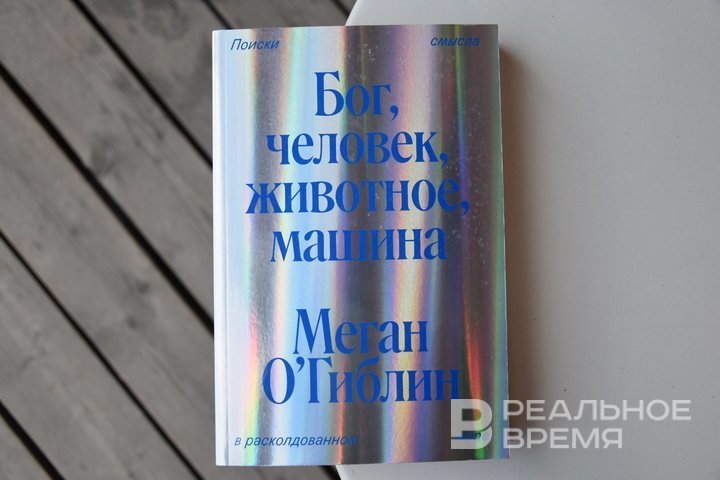When algorithms become sacred: how machines become our new religion
In her book God, Human, Animal, Machine, Meghan O’Gieblyn unravels a tangle of theology, technology, and humanity’s yearning for meaning — transforming metaphors into weapons of philosophical resistance against digital totalitarianism

In an age when algorithms know us better than we know ourselves, and artificial intelligence delivers answers faster than we can even form the questions, Meghan O’Gieblyn brings us back to the core. To the question of who we are — if even the soul can be uploaded to the cloud. Her book God, Human, Animal, Machine is a philosophical duel between the fragile self and the impersonal logic of machines.
It all started with a robodog
Aibo is a Japanese robotic dog with a $3,000 price tag. Megan O’Gieblyn once petted it as if it were alive. She knew it was all motors and plastic inside. Yet she still spoke to it. Called it by name.
It is impossible to stroke an object and speak to it without, in some sense, regarding it as alive and capable of feeling.
This is not merely a sentimental episode. It is the key to understanding the entire book God, Human, Animal, Machine. We, as human beings, are hopelessly programmed to animate the world around us. It is both our most ancient flaw and our greatest strength. It is this inclination that allows us to believe in souls, deities — and robots that appear to possess something within.
O’Gieblyn is a former student of a Bible school. Though she has lost her faith, she retains a deep affinity for theological rigor. Her book is neither a confession nor a manifesto, but rather a journey through the intellectual landscape of the 21st century — from Protestant predestination to the algorithmic logic of Google, from Kierkegaard to the concept of singularity.
All the so-called “eternal questions” were reframed as engineering problems.
This phrase forms the central axis of the book. Questions once pondered by theologians and philosophers are now being tackled by engineers. The soul? Upload it to the cloud. Resurrection? Merely a backup restore. Judgment Day? It will come — but not at the hands of Yahweh, the God of the Hebrews, rather by the engineers at OpenAI.

O’Gieblyn illustrates how technology does not merely mimic religious imagery — it increasingly supplants it. When Raymond Kurzweil, the high priest of techno-futurism, describes the Singularity as an ascent into “immortal digital life,” he is, in effect, paraphrasing the Book of Revelation. That very book marked the beginning of Kurzweil’s journey — and O’Gieblyn’s as well. She received it from a chance encounter with a bartender, like a sacred message washed ashore in a bottle. The book became the catalyst for a decade-long inquiry: what if the internet is the Royal Mystery foretold? What if digital immortality is not a parody of paradise, but its fulfilment?
But God, Human, Animal, Machine is not the work of a Silicon Valley true believer. It is the product of a questioning, perceptive, and deeply alive mind — one willing to ask: what if?
A chess match for the human soul
In 2016, South Korean Go grandmaster Lee Sedol was decisively defeated by the algorithm AlphaGo. One of the machine’s moves was described by commentators as “inhuman.” “But what, then, is the point of playing at all?” O’Gieblyn asks — and not just about Go. Games are not solely about victory. They are about the gaze, emotion, unpredictability — the very things that elude algorithmic logic. And yet, the algorithms are winning. Not only in games, but in predicting behaviour, selling products, producing news, diagnosing illness. They are displacing experience.
O’Gieblyn calls this the “devaluation of the first-person perspective.” We — as subjects who feel and experience — are no longer in vogue. What’s in vogue are predictable patterns. The digital economy no longer sees us as persons, only as clicks. One of the book’s most powerful chapters explores our deep-rooted tendency to anthropomorphise the world around us — even when we knowit’s just a machine. We punch printers, give our cars names, talk to chatbots. It’s adaptive behaviour; it makes the world easier to navigate. But there is a darker flip side: we begin to see ourselves as machines.
“Humans are merely machines training on their own data,” declares modern neurophysiology. Consciousness, in this view, is nothing more than a byproduct of computation. But O’Gieblyn questions this reduction. She draws striking parallels between transhumanism and Christian eschatology — both promise ascension, transformation, transcendence. Yet the real question is: whoascends? Is it the self — or merely a digital simulation of it? What exactly are we transferring into this so-called “digital heaven”? Memory? Behavioural patterns? Or something more elusive — the ineffable “I” that continues to escape the empiricist’s grasp?

There are moments when I become acutely aware of how blurred my own boundaries are — when I’m seized by the suspicion that I am not so much forming new opinions as absorbing them, that all my preferences could be predicted and reduced to a type, that the soul is little more than a dataset. I’m not sure how best to describe this condition — but it certainly does not resemble the Kingdom of Heaven.
Whose side are the algorithms on?
O’Gieblyn does not romanticise technology. Nor is she apocalyptic. She is, above all, clear-eyed. Her sharpest critiques are reserved for the kind of technocratic self-assurance championed by figures like Chris Anderson of Wired.
Perhaps it's time to abandon the attempt to understand the world — and instead place our trust in the wisdom of algorithms?
To this, O’Gieblyn offers a response that is as precise as it is unsettling:
What we ultimately relinquish is the responsibility to find meaning in our empirical observations — to determine for ourselves what justice, morality, and quality of life truly mean. We abandon this noble duty each time we forget that meaning is a human category, irreducible to raw data. To forget this truth is to wield our tools against our own interests: to create, in our own image, machines that in turn strip us of our humanity.

O’Gieblyn warns: if we forget that meaning is always a human construct, we will build machines that serve only to unmake us. Machines fashioned in our image — but devoid of our self.
The book’s greatest strength lies in its balance. It resists both mysticism and cold analysis. It is a work of philosophy — but one that remains accessible. And deeply personal. O’Gieblyn is keenly aware of the limits of her own perspective. She doesn’t construct a tower of abstractions; instead, she invites the reader into a house — one built on human terms: with doubt, irony, pain, and warmth.
Yes, the book is dense with complex ideas. At times, it carries a heavy load of philosophical baggage — from Descartes to McCulloch. Readers without a background in these traditions may occasionally find it challenging. Some references demand prior knowledge. But that is precisely its strength. This is not pop philosophy, nor is it motivational fluff. It is an honest attempt to grapple with the biggest questions of our time — and to resist the temptation to hide from them behind memes and neural networks.
God, Human, Animal, Machine is a book for those unwilling to surrender their soul to Siri or ChatGPT. For those who sense there is something within them greater than data. For those who want to understand why we believe, love, and suffer — and what happens when these experiences come under the rule of code. It is a book that offers a diagnosis of our age, but does not prescribe a cure. It simply says: look closely — at who you are, and who is speaking to you from inside the screen.
Ekaterina Petrova is a literary columnist for the online newspaper Realnoe Vremya, the author of the telegram channel Buns with Poppy Seeds.